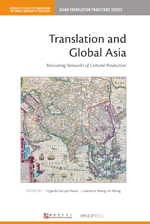Asian Translation Traditions Series:
Translation and Global Asia
Edited by
Uganda Sze-pui Kwan and Lawrence Wang-chi Wong
Translation and Global Asia
Edited by
Uganda Sze-pui Kwan and Lawrence Wang-chi Wong

| Table of contents | ||
| Acknowledgements |
ix | |
| Introduction Uganda Sze-pui KWAN |
xi | |
Disembodiment and Dissemination: The Chinese Factor |
||
| Japanese Poetry in Chinese Translation from the Ming Period Joshua FOGEL |
3 | |
| Translation and Sinicization: Xiaojing Translation in Tuoba Wei and Mongol Yuan Jae-ho SHIN |
31 | |
| “Chouban yiwu” (Handling the Affairs of the Barbarians): Translators in the Translation History of the Eighteenth to Nineteenth Century China Lawrence Wang-chi WONG |
55 | |
Cultural Divergence and Assimilation through Translation |
||
| “What’s in a Name?” North Korean Literary Translators and the Appropriation of Foreign Culture from the Late 1940s to the Mid-1960s, the Case of Im Hak-Su Theresa HYUN |
87 | |
| Tinio Translating: May Katwiran Ba? Corazon D. VILLAREAL |
107 | |
| Translating the Foreign into the Local: The Cultural Production and Canonization of Buddhist Texts in Imperial Tibet Georgios T. HALKIAS |
143 | |
Navigating and Negotiating Cultural Space through Literary Translation |
||
| Habitations of Resistance: The Role of Translation in the Creation of a Literary Public Sphere in Kerala E. V. RAMAKRISHNAN |
169 | |
| Russian Literature in Marathi Polysystem: In the Colonial and Neocolonial Context Megha PANSARE |
183 | |
| The Emerging Literariness: Translation, Dynamic Canonicity and the Problematic Verisimilitude in EarlyThai Prose Fictions Phrae CHITTIPHALANGSRI |
207 | |
(De)Colonialization and Elite Collusion |
||
| “Incest Performed”: The Neocolonial Perversion of Translation in Malaysia Nazry BAHRAWI |
243 | |
| Transnational Mobility, Translation, and Transference: The Cultural Identities of British Interpreters in Two Colonial Asian Cities (1840–1880) Uganda Sze-pui KWAN |
265 | |
| Contributors | 301 | |
Research Centre for Translation, The Chinese University of Hong Kong.